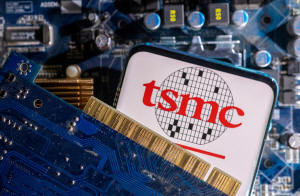TSMC tells vendors to delay chip equipment deliveries - sources
 Send a link to a friend
Send a link to a friend
 [September 15, 2023] By
Sam Nussey, Fanny Potkin and Toby Sterling [September 15, 2023] By
Sam Nussey, Fanny Potkin and Toby Sterling
TOKYO/SINGAPORE/AMSTERDAM (Reuters) -Taiwan's TSMC has told its major
suppliers to delay the delivery of high-end chipmaking equipment, as the
world's top contract chipmaker grows increasingly nervous about customer
demand, two sources familiar with the matter said.
Shares in TSMC suppliers including Dutch-based ASML declined following
the Reuters report.
The instruction by TSMC, which is grappling with delays at its $40
billion chip factory in Arizona, is aimed at controlling costs and
reflects the company's growing caution about the outlook for demand, the
sources said.
Suppliers currently expect the delay to be short-term, the sources said,
declining to be named as the information is not public.
TSMC said it does not comment on what it called "market rumour".
The company referred Reuters to comments by CEO C.C. Wei in July that
weaker economic conditions, a slower recovery in China and softer
end-market demand is making customers more cautious and more mindful of
controlling inventory.
Companies affected by the instruction to delay include ASML, which makes
lithography equipment essential for high-end chipmaking, one of the
sources said.

In an interview with Reuters last week, ASML CEO Peter Wennink said some
orders for its high-end tools have been pushed back, without saying who
by, and that he expected it would be a "short-term management" issue.
ASML, Europe's most valuable tech listed company, is operating at
maximum capacity and overall sales are forecast to grow 30% this year.
"We've had several (news) reports about fab readiness. Not only in
Arizona ... but also in Taiwan," Wennink told Reuters, referring to
preparations for chip manufacturing.
Shares in ASML declined 2.5%, making the company the biggest loser in
the euro zone STOXXE50 index.
ASM International, a smaller equipment firm that is also a supplier to
TSMC, fell 5.6%, with BE Semiconductor, a packaging equipment firm, down
3.3%.
Major U.S. semiconductor firms Applied Materials , KLA Corp and Lam
Research were all down between 2.2% and 2.6% in premarket trading.
Analyst Michael Roeg of Degroof Petercam said he was not surprised by
the selloff.
"There has been a lot of excitement about artificial intelligence and
the implications for the semiconductor industry," he said, adding that
AI was positive for TSMC, which makes chips for NVIDIA.
"However the strength in demand for AI chips is not strong enough to
compensate (for) what is happening in other segments."

[to top of second column] |

A smartphone with a displayed TSMC (Taiwan Semiconductor
Manufacturing Company) logo is placed on a computer motherboard in
this illustration taken March 6, 2023. REUTERS/Dado Ruvic/Illustration/File
Photo

He cited mobile phone, laptop, industrial and more recently
automotive chips as problem areas. "That's a lot of end markets that
are sluggish," he said.
DOUBLE WHAMMY
TSMC has been forced to push back production at the Arizona plant by
a year to 2025, as it struggled to recruit workers and faced
pushback from unions on efforts to bring in workers from Taiwan.
"If you ship a lot of people from Taiwan to help build a factory in
Arizona, they're not working somewhere else. So this is kind of a
double whammy," Wennink said.
TSMC Chairman Mark Liu said last week there had been "tremendous"
improvement at the Arizona site in the last five months.
The Taiwanese chip giant is not alone in worrying a bounceback in
demand may take longer than expected.
Apple, a key TSMC customer, launched a new series of iPhones this
week that included a faster chip, but it did not raise prices,
reflecting the global smartphone slump.
Media reports that Beijing has ordered some government employees to
stop using iPhones at work, and the launch by tech firm Huawei of a
flagship phone using Chinese-made chips, is causing further unease
at TSMC, one of the sources said.
TSMC used to make chips for Huawei but suspended supplies after
Washington imposed sanctions on the Chinese firm. Analysts have
found Huawei worked with Chinese contract chipmaker Semiconductor
Manufacturing International Corp (SMIC) to manufacture an advanced
chip for its latest smartphone.

TSMC forecast in July a 10% slide in 2023 sales and as much as a 4%
point drop in operating margin this quarter from the previous
quarter, citing weak demand for smartphones and PCs and uncertainty
about the market for artificial intelligence.
The chipmaker is also facing elevated capital expenditure, which
increased 21% to $36 billion last year, from expansion plans put in
place during the pandemic-driven chips boom.
It estimated in July that investment spending for this year would be
at the lower end of a previous forecast of $32 billion to $36
billion, and said it expected a slower increase in the next few
years.
(Reporting by Sam Nussey in Tokyo, Fanny Potkin in Singapore and
Toby Sterling in Amsterdam; Editing by Miyoung Kim and Stephen
Coates)
[© 2023 Thomson Reuters. All rights
reserved.]
This material may not be published,
broadcast, rewritten or redistributed.
Thompson Reuters is solely responsible for this content. |